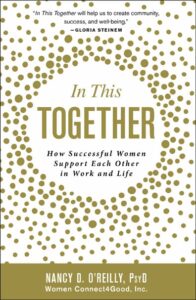 Ready to get ahead? Then you need to start working with other women, not against them. We’re all on the same team, working toward the same goals, so why on earth do we sometimes forget that and treat each other badly, sabotage one another’s work, or hold another woman down? The aggression women can display towards one another can derail a job, or even a career, and works against women’s progress as a whole. This aggression doesn’t necessarily have to be obvious through bullying or other direct behaviors, it can be indirect and still quite devastating.
Ready to get ahead? Then you need to start working with other women, not against them. We’re all on the same team, working toward the same goals, so why on earth do we sometimes forget that and treat each other badly, sabotage one another’s work, or hold another woman down? The aggression women can display towards one another can derail a job, or even a career, and works against women’s progress as a whole. This aggression doesn’t necessarily have to be obvious through bullying or other direct behaviors, it can be indirect and still quite devastating.
As we write in the new book, In This Together, sometimes women will sabotage one another and intentionally lie or destroy the work of others to discredit them, they may engage in backstabbing, or even take credit for the work of others. Whether it’s called bullying, bitchiness, relational or indirect aggression, or something else, women who hold each other back set us all back, which pushes gender equality even further away. We can’t allow ourselves, or our progress, to be derailed by the bad behaviors of others, but instead must focus on ways we can work together, cooperate and collaborate to achieve our common goals.
In the workplace, women managers sometimes seek to protect their status in a hierarchy dominated by men by being overly tough on their female employees. This is what University of Arizona management professor Allison Gabriel calls the “Queen Bee Syndrome.” Gabriel conducted a large study and found that women, especially those who display traditionally masculine traits, such as dominance, are especially targeted. Women of color are also targeted more often.
However, aggression among women isn’t limited to those in power positions. Generally, women are meaner to each other than men are to women. Through her research, Gabriel concludes that women are more likely to suffer from what she calls “female-instigated incivility” than men are, and fall victim to low-intensity deviant behavior, like ignoring, interrupting, mocking, and other disrespectful treatments, used to put women back in their place.
What Not To Do
Some women can be disruptive for what appears to be nothing more than for the sake of disrupting. Here’s an example of a woman most of us have probably encountered at least once in our professional lives, and her actions are perfect examples of indirect aggression:
“Brittney” was hired to do a job with a specific deadline, but she didn’t do it. She also did not take responsibility for her failure to perform. In fact, not only did she fail to deliver, she manipulated her employer and other people around her. She took other people’s ideas and appropriated them as her own, without giving credit to anyone else. She doesn’t know what she’s supposed to do, and she’s not good at following directions. Whether her actions are merely thoughtless or intentional, she HAS demonstrated that you can’t trust her.
Brittney’s behavior has the potential to be detrimental to any woman – or man – involved in the project. Her lack of responsibility, follow through, and performance destroys relationships and kills friendships. Chances are Brittney can’t be rehabilitated, at least in her current position. Don’t allow yourself to get angry. While anger can be a great motivator, we weaken our ability to make change if we get derailed by our differences or spend too much time stressing over bad behavior. When you meet someone like this, your best bet is to say thanks but no thanks and move forward without her. Don’t try to be a shero and “fix her.” If you’re stuck in a workplace with her, find ways to work around her or cover for potential lack of follow-through. We discuss many options for working with this kind of person in Dr. Nancy’s new book, In This Together.
What’s important to keep in mind is that Brittney is the exception, not the rule. So is the bully in your office, and the snarky woman running the committee. It is our job to remain focused on being positive, helping others, and supporting one another. If we get sidetracked into attacking another woman, we’re less likely to organize and fight for equality for all. We need to actively look for ways to help one another, and put aside judgment and criticisms, and focus on what we share in common – our experiences, hopes, and dreams—and how we can help each other. Let’s stop working against one another and instead work together to make gender equality happen.
Order Dr. Nancy’s New Book Today!
 Looking at what makes women mean and dealing with bullies are just a couple of the issues covered in Dr. Nancy’s new book, In This Together: How Successful Women Support Each Other In Work and Life, along with thoughts, inspiration, and stories from 40 successful women.
Looking at what makes women mean and dealing with bullies are just a couple of the issues covered in Dr. Nancy’s new book, In This Together: How Successful Women Support Each Other In Work and Life, along with thoughts, inspiration, and stories from 40 successful women.
Order your copy – and gifts for your friends today!

